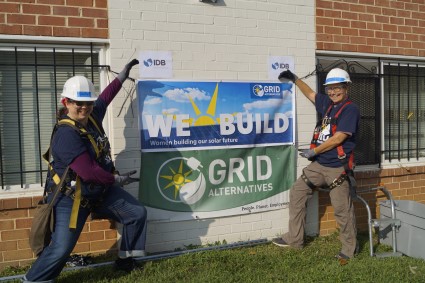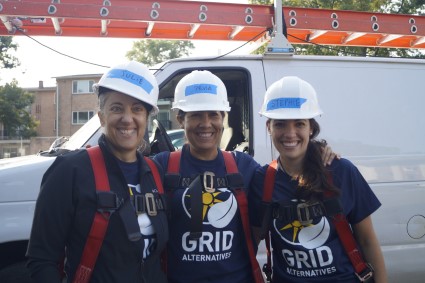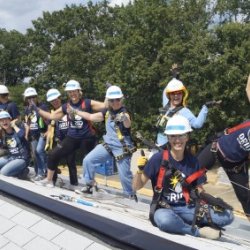On August 26, 2017, a diverse volunteer group including women employees from the Inter-American Development Bank’s energy division kicked off the largest solar array in Prince George’s County, Maryland for We Build. We Build is an all-women solar build led by GRID Alternatives that provides solar technology to underserved communities while championing for women in the solar or environmental field.
We Build volunteers got on the roof of the Sun Crest Apartment in Capitol Heights, MD to begin the solar installation of a 250 kW solar system, a project that will continue to preserve the affordability of the complex and improve the quality of life for over 120 low-income residents across 42 units. The solar install is estimated to cover up to 95% of the apartment complex’s energy bill, which will help the building owner afford renovations for energy efficiency services, including electrical upgrades and new kitchens per unit and common area. This project also benefits the community: renovating a local affordable housing complex in an area with a history of crime rates may improve the safety and community health of the area, based on past studies. In addition, the environmental impact of the solar will prevent 6,520 tons of greenhouse gas from entering the atmosphere. This is the equivalent to planting 151,650 trees. (For comparison, New York’s Central Park has only 26,000 trees.)
 GRID is inspired to host We Build to increase women representation in the energy field and expand energy access --echoing some of the volunteers’ motivational reasons for coming out on a Saturday.
GRID is inspired to host We Build to increase women representation in the energy field and expand energy access --echoing some of the volunteers’ motivational reasons for coming out on a Saturday.
Rachel Andrex is starting the first steps of a career change into the STEM field and thought We Build was a great start. Rachel says, “This seems like an amazing opportunity to learn something hands-on immediately... and I have never crawled up on a roof before, or did any kind of roof-work before!”
In the US, women only make up 28% of the solar workforce based on the Solar Foundation’s 2016 Solar Jobs Census. The same lack of women representation is also reflected internationally. Julie T. Katzman, Executive Vice President and Chief Operating Officer of the Inter-American Development Bank, explains how men and women are not equally benefiting from access to electricity. Julie shares, “If we talk outside the US economy context, in the developing world and many of the countries in the Latin America and Caribbean, the burden of furnishing fuel, whether that’s wood or other fuel, tends to fall on women as well as the burden of providing water.” Because the responsibility is often assigned to women to provide energy and water to the family, “this means that there are fewer opportunities to earn incomes outside the house, and it means young women and girls are often taken out of school to help share that burden,” says Julie.
 Along with men and women not equally benefiting from the access to electricity, women are also excluded from energy discussions that have greater impacts on their livelihood. Virginia Snyder, an Energy Specialist from the Inter-American Development Bank shares, “Many times women are not part of the decision-making from the top level, like regulation, how things are designed and planned. As a result, their needs are not considered.” Virginia, who used to volunteer with GRID in California before moving to DC, helped organized this team-building opportunity for her co-workers from the bank. “The experience is great because it’s great to do things for the community with your coworkers and to make an impact. Hopefully this will replicate throughout the area.”
Along with men and women not equally benefiting from the access to electricity, women are also excluded from energy discussions that have greater impacts on their livelihood. Virginia Snyder, an Energy Specialist from the Inter-American Development Bank shares, “Many times women are not part of the decision-making from the top level, like regulation, how things are designed and planned. As a result, their needs are not considered.” Virginia, who used to volunteer with GRID in California before moving to DC, helped organized this team-building opportunity for her co-workers from the bank. “The experience is great because it’s great to do things for the community with your coworkers and to make an impact. Hopefully this will replicate throughout the area.”
This initiative is part of GRID Alternatives’ national Women in Solar Program to build a diverse, equitable and inclusive solar industry by providing pathways to technical careers for women*, highlighting the voices of women of color in the industry, and providing national leadership on solar workforce diversity. Events like We Build signals the significance of strengthening the growing solar industry by increasing the diversity of its workforce.
About the IDB
The Inter-American Development Bank's mission is to improve lives. Founded in 1959, the IDB is one of the main sources of long-term financing for the economic, social and institutional development of Latin America and the Caribbean. The IDB also conducts state-of-the-art research projects and provides policy advice, technical assistance and training to public and private clients throughout the region. www.iadb.org

